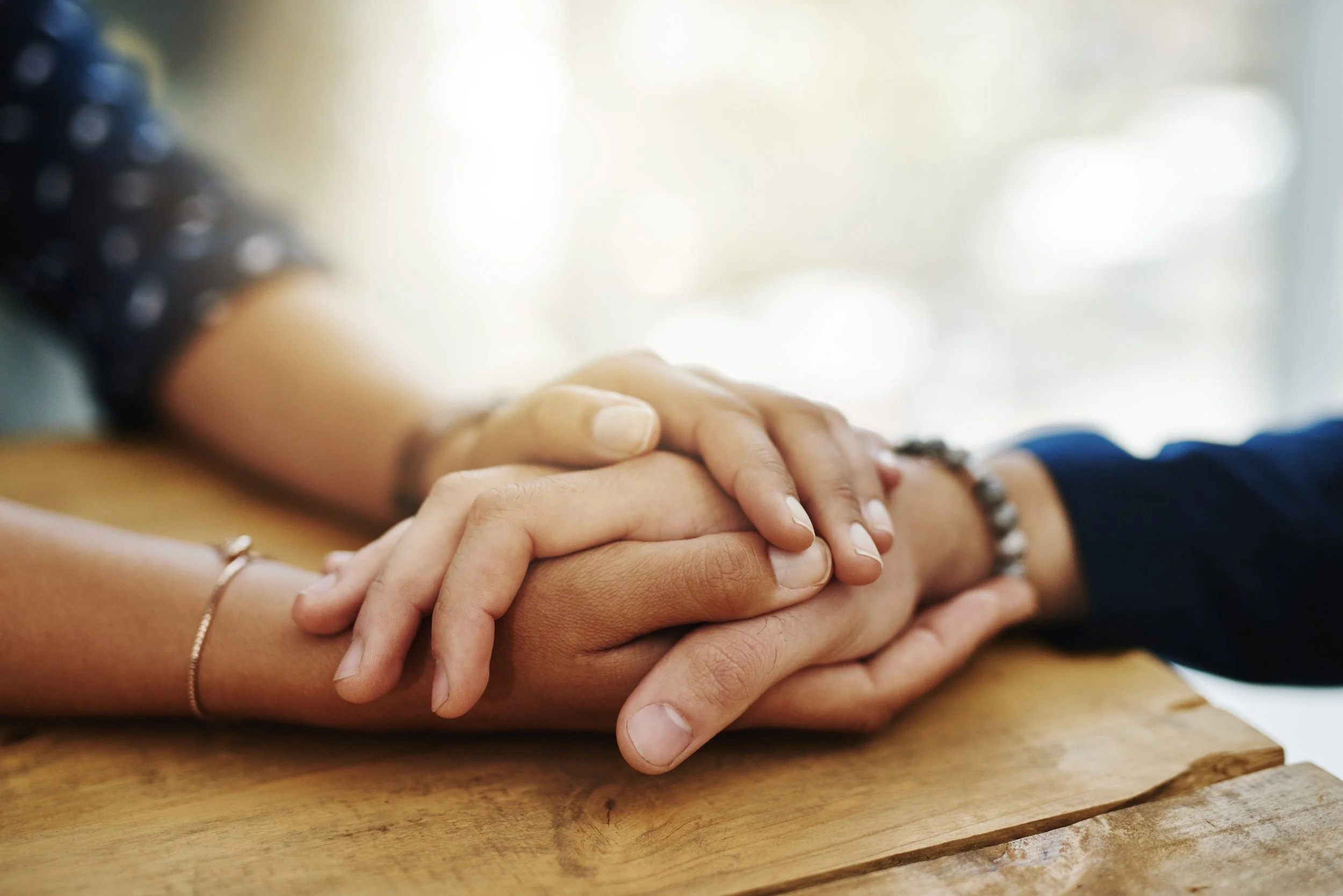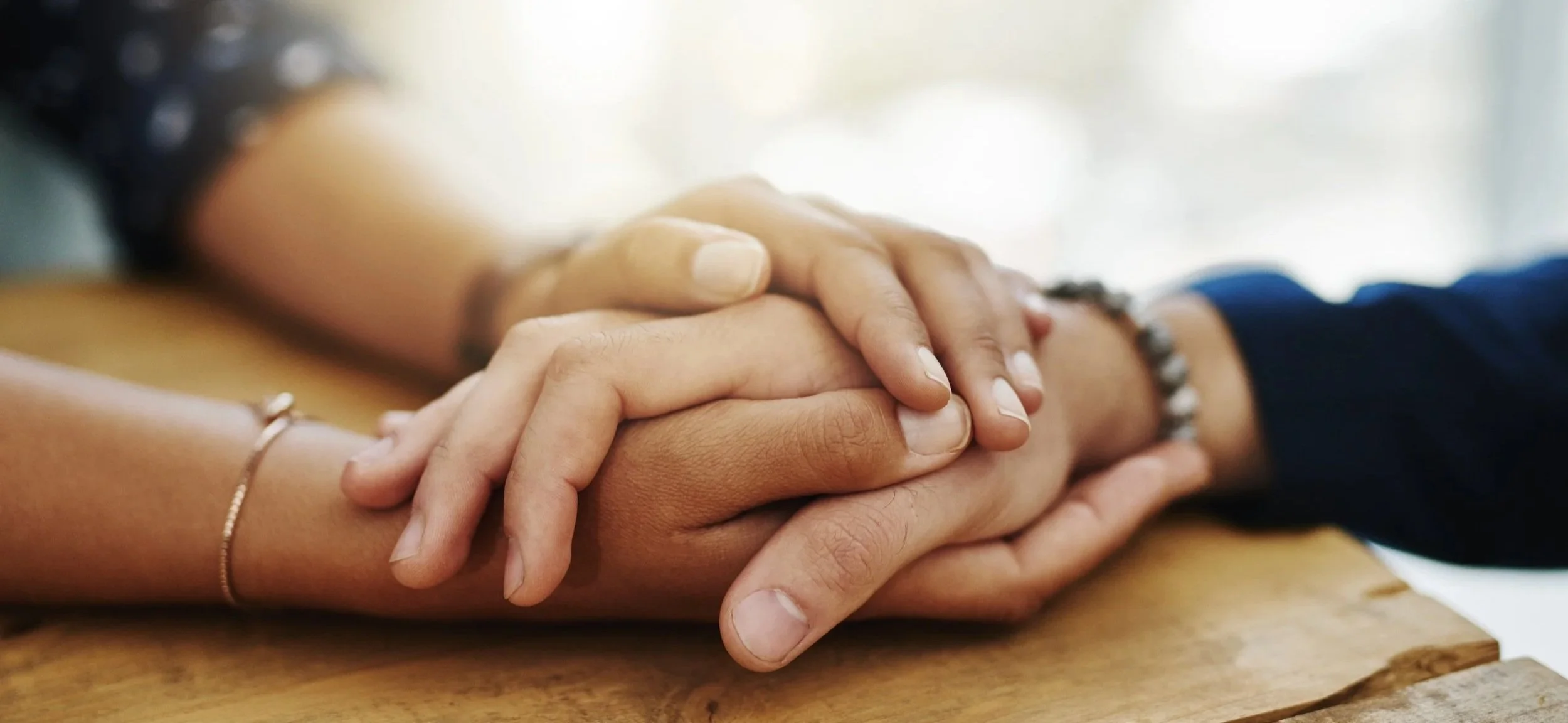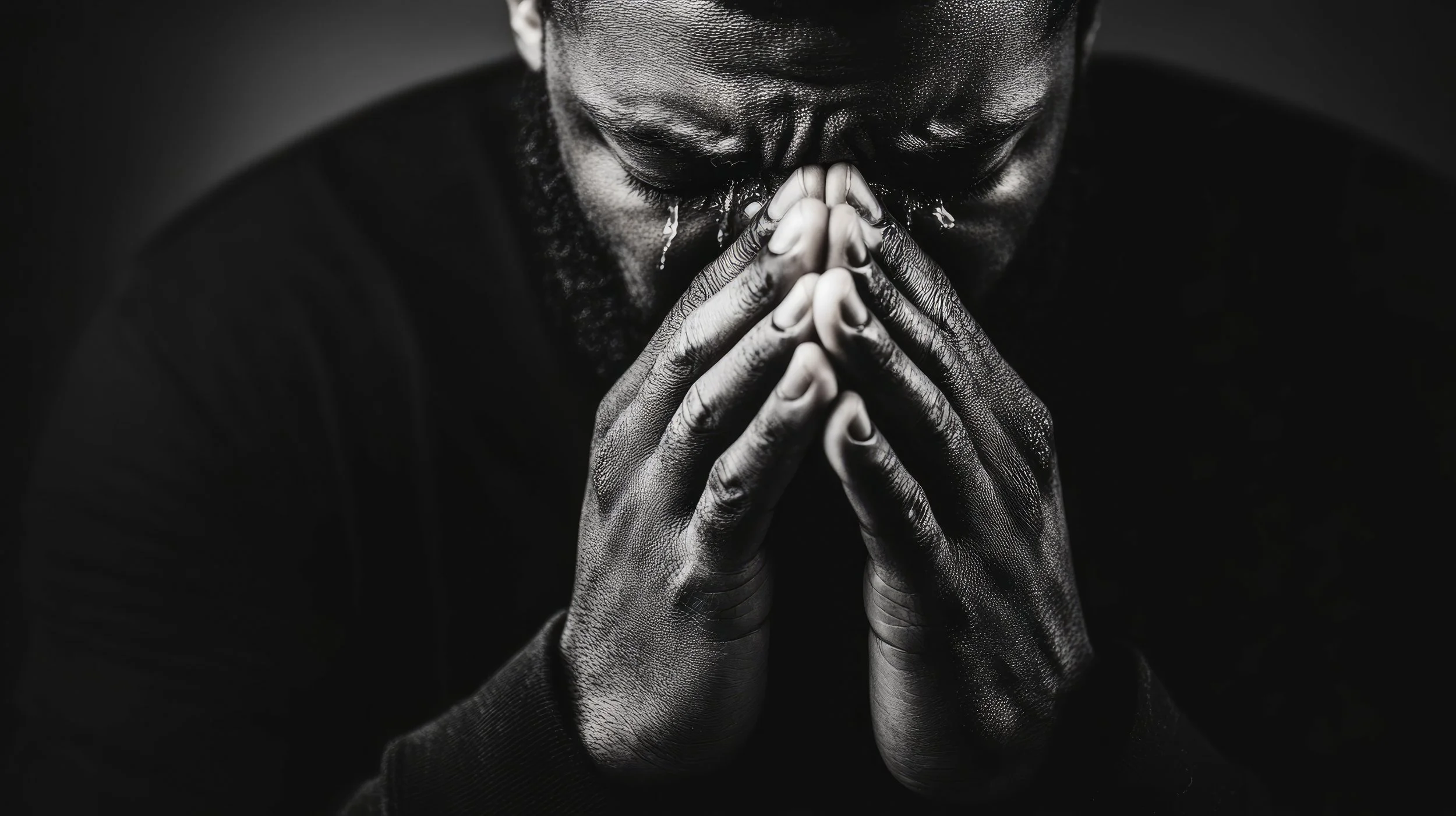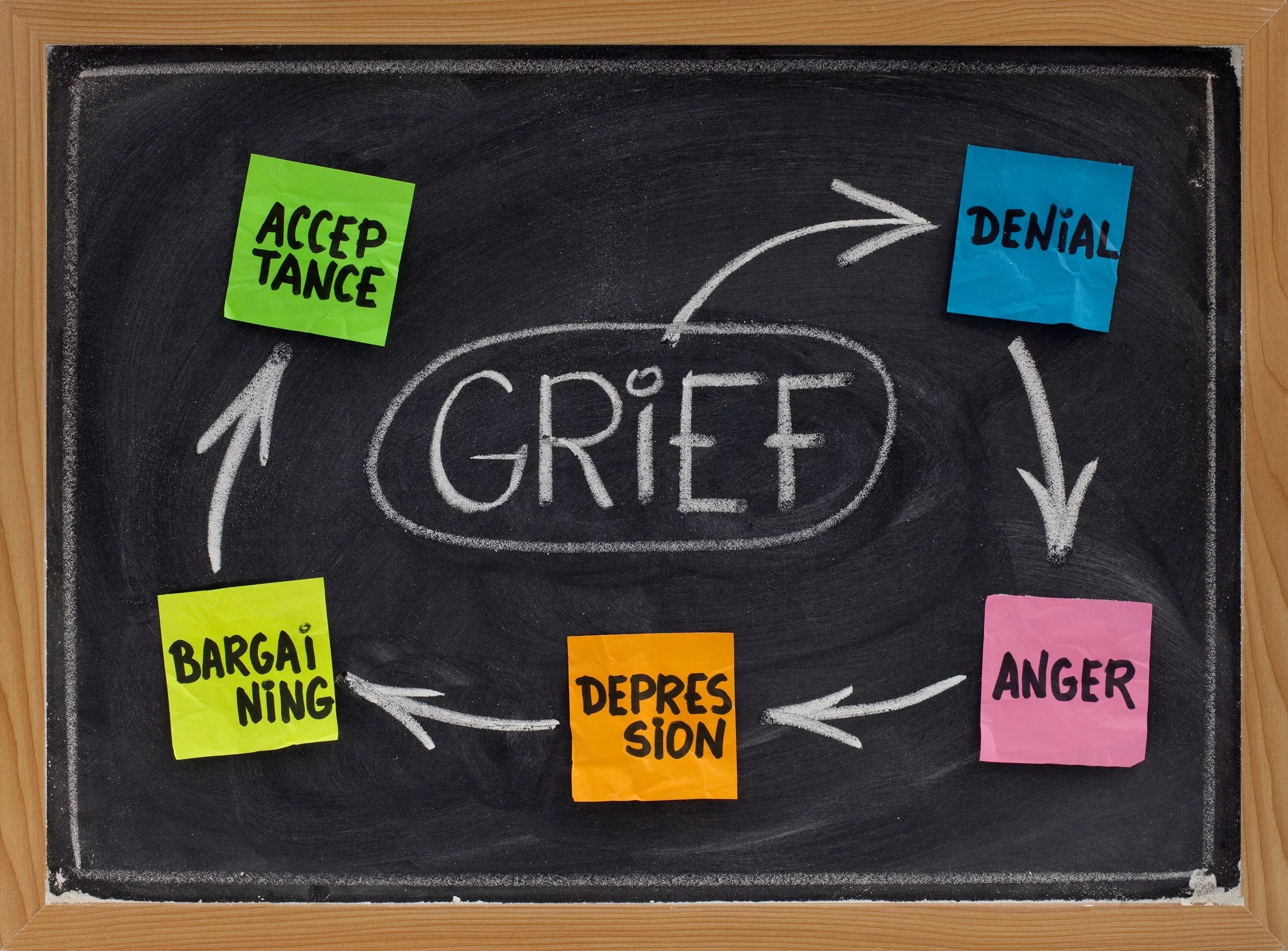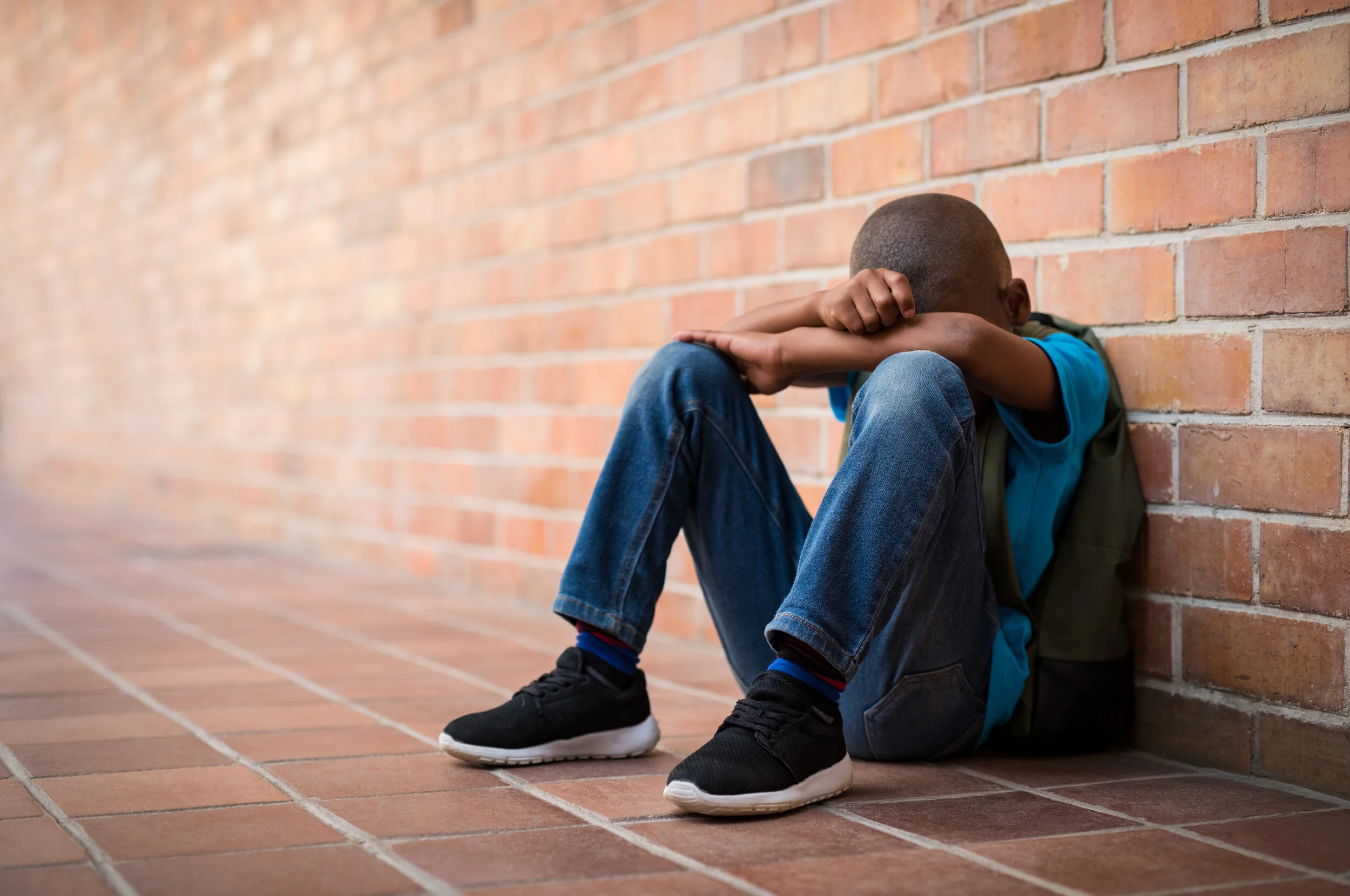
Navigating Grief Together: A Message from Dr. Courtney Stivers
Over the past two weeks, our workplace community has been touched by a profound wave of loss. Three of our employees have experienced the passing of close loved ones, and within my own extended family, we are mourning the loss of a child to cancer. These moments remind us of the fragility of life, the depth of human love, and the universal experience of grief that connects us all.
Over the past two weeks, our workplace community has been touched by a profound wave of loss. Three of our employees have experienced the passing of close loved ones, and within my own extended family, we are mourning the loss of a child to cancer. These moments remind us of the fragility of life, the depth of human love, and the universal experience of grief that connects us all.
Grief is not a linear journey, nor is it something that follows rules or timelines. It arrives without warning, lingers in unexpected ways, and reshapes our understanding of the world. For some, it shows up as tears. For others, silence. For many, it appears as exhaustion, confusion, or even moments of laughter that bring guilt. All these experiences are real, valid, and deeply human.
The Weight We Carry
When loss touches a workplace, it doesn’t stay at the door. We bring our whole selves to our work—our strengths, our fears, our hopes, and our heartaches. As we navigate these recent losses, it's important to recognize that grief affects each of us differently. There is no “right way” to mourn. What matters is that no one faces it alone.
To everyone else who wants to help: your compassion and patience can be a powerful source of comfort. Sometimes the smallest gestures—checking in, offering help, or simply acknowledging someone’s pain—can mean more than you realize.
When Grief Hits Close to Home
As I walk through grief within my own family, I am reminded of both the pain and the privilege of being human. Losing a child—especially to something as senseless as cancer—is a wound that words cannot fully hold. My family is learning, day by day, how to breathe differently, love differently, and find meaning again in the midst of heartbreak.
Sharing this with you is not easy, but it feels important. Leaders are not immune to loss. Professionals do not cease to be vulnerable. And even those who help others through their darkest moments must also learn to walk through their own.
Years ago, I endured the painful loss of my mother after her battle with an aggressive from of breast cancer. Losing a parent leaves a particular kind of void—one filled with memories, gratitude, and the ache of unfinished conversations.
During that time, my family was lifted by tremendous support from friends, loved ones, and our community. Their meals, prayers, messages, and simple presence reminded us that even in the darkest seasons, we do not walk alone. That support helped shape how I understand compassion today—and it continually inspires the way I show up for others in moments of loss.
Supporting One Another Through the Process
Grief becomes more bearable when it is met with community. In the coming days and weeks, I encourage all of us to:
Show grace — to yourself and others.
Lean on the support available — whether through colleagues, friends, mental health resources, or spiritual practices.
Recognize signs of overwhelm — such as withdrawal, irritability, or fatigue — and reach out when you notice them in others.
Allow yourself to feel — whatever arises, without judgment.
Healing doesn’t mean forgetting. It means finding ways to carry our memories forward while learning to live with a new kind of normal.
Sending hugs to anyone who is hurting today. You do not have to go through it alone.
The Grieving Body: How Loss Lives in the Body
Grief is one of the most painful and disorienting human experiences. Many describe it as feeling as though a part of themselves has been cut away—an absence so profound it is felt not only emotionally, but physically. In The Grieving Brain, psychologist and neuroscientist Mary‑Frances O’Connor, PhD, offers compelling scientific and clinical insight into why grief feels the way it does and how loss fundamentally reshapes the body and brain.
A Book Review of The Grieving Body By Mary‑Frances O’Connor, PhD.
Grief is one of the most painful and disorienting human experiences. Many describe it as feeling as though a part of themselves has been cut away—an absence so profound it is felt not only emotionally, but physically. In The Grieving Brain, psychologist and neuroscientist Mary‑Frances O’Connor, PhD, offers compelling scientific and clinical insight into why grief feels the way it does and how loss fundamentally reshapes the body and brain.
O’Connor’s work challenges the common misconception that grief is “all in our head.” Instead, she demonstrates that grief is a whole‑body experience, rooted in biology, attachment, and survival.
Grief as a Biological Experience
According to O’Connor, bereavement activates powerful physiological responses. The death of a loved one can trigger increased heart rate, elevated blood pressure, heightened stress hormones, and inflammatory processes throughout the body. These responses occur because close relationships are not simply emotional bonds—they are part of our survival system.
Humans are wired for attachment. When we form a close bond, our nervous systems become attuned to another person’s presence, habits, and rhythms. Over time, the brain comes to rely on that relationship in ways that operate largely outside of conscious awareness. The sudden loss of that bond places the body into a state of alarm, as though something essential to survival has disappeared.
This helps explain why grief can feel so physically distressing: the body is reacting to danger, not metaphor.
The Loneliness of Loss and the Brain’s Search
One of O’Connor’s central themes is the brain’s effort to make sense of absence. After a loss, the world can feel painfully unfamiliar. Widows and widowers often describe a deep loneliness that cannot be easily named—not merely the absence of companionship, but the absence of a shared reality.
O’Connor explains that grief is not just cognitive (“I know they are gone”), but also emotional and neurological. The brain continuously predicts where our loved one will be, how they will respond, and how we will move through the world together. After a death, the brain must repeatedly confront the mismatch between expectation and reality.
This ongoing process of recalibration is exhausting and can leave grieving individuals feeling confused, unfocused, or emotionally overwhelmed.
The Body Keeps the Score of Loss
A particularly sobering contribution of The Grieving Brain is O’Connor’s discussion of the physical risks associated with bereavement. Research shows that chronic health conditions may emerge or worsen sooner following the death of a loved one. The prolonged stress of grief can accelerate inflammation, weaken immune functioning, and exacerbate underlying medical vulnerabilities.
O’Connor highlights the well‑documented “widowhood effect,” which shows a significantly increased risk of illness and mortality following spousal loss. In the first one to three months after a wife’s death, a surviving husband’s risk of death approximately doubles. Following a husband’s death, a surviving wife’s risk increases by approximately 50 percent. While this elevated risk decreases over time, bereavement is clearly a period of heightened physical vulnerability.
In rare but real cases, sudden cardiac events—sometimes referred to as “broken heart syndrome”—can occur following acute emotional loss.
Clinical Implications and Compassionate Care
O’Connor’s work carries an important message for both clinicians and bereaved individuals: grief deserves medical and psychological attention. Survivors are often encouraged to “be strong” or “move on,” yet the science suggests the opposite—grief requires care, monitoring, and compassion.
Medical follow‑ups, mental health support, and reduced self‑criticism during early bereavement are not indulgent; they are protective. Understanding grief as a biological process may also relieve some of the shame grieving individuals feel when their bodies seem to “betray” them.
A Grounded, Hopeful Perspective
While The Grieving Brain is rooted in neuroscience, it is ultimately a deeply humane work. O’Connor does not offer quick solutions or timelines. Instead, she emphasizes that adaptation after loss takes time and that the brain is capable of relearning a world forever changed.
This book is particularly valuable for grief therapists, medical professionals, and anyone navigating loss. It validates the experience of grief as both profoundly painful and deeply human—something that happens not because we are weak, but because we are bonded.
Final Reflections
The Grieving Brain reframes grief as a biological, relational, and survival‑based experience. Mary‑Frances O’Connor reminds us that love does not end when someone dies—and neither does the body’s memory of that love.
Grief lives in the body because love lived there first.
Mourning
In graduate school I learned about the stages of grief and loss by Kubler-Ross. These are not frequently known to the general public. In the United States, we typically do not accept the idea of loss well. We protest when our political candidates lose. When we lose we protest the conditions of the lost. Rather, we embrace denial with an almost salient delusion of grandeur: this cannot happen to me!
Trigger Warning: Mentions of Death, Dying, and Suicide.
In graduate school I learned about the stages of grief and loss by Kubler-Ross. These are not frequently known to the general public. In the United States, we typically do not accept the idea of loss well. We protest when our political candidates lose. When we lose we protest the conditions of the lost. Rather, we embrace denial with an almost salient delusion of grandeur: this cannot happen to me!
Mourning is a difficult business. We have a Lincoln Memorial, however the memorializing gets dwarfed by the monument. We have gravestones in cemeteries, yet little actions to process the actual grief get performed. Mourning needs to be planful, intentional, and meaningful.
My first serious brush with death was when a friend of mine: Spc. Kristopher died in Taji, Iraq while serving with the 10th Cavalry. Upon hearing the news, my grandfather told me: “Let’s light a candle for him.” My late grandfather was a USAF Staff Sergeant who served stateside in the Korean Conflict. His act of mourning at the funeral was to salute the closed casket.
When my grandfather passed, my acts of mourning were light a candle, and enjoy some southern comfort food. I lost count of how many orders of biscuits and gravy and chicken fried steaks I consumed in 2022. For me the foods he loved to eat, and share in those morsels of flavor or ‘gravy trains’ of flavor was an avenue to embrace mourning.
Today, on 12.02.2025, I learned Pastor David Bucknam, MA, MDiv, LCPC passed. Dave was one of my favorite colleagues at The Antioch Group Incorporated. Dave was a individual who left a valuable and lasting legacy for all he came into contact with! Dave was a dual citizen of the United States and the Dominion of Canada. To engage in mourning his passing I drank a Tim Horton’s Medium Roast in my keurig instead of my standard Green Mountain/Starbucks/Lavazza rotation.
Mourning is an action. It is a part of life that frequently we do not wish to visit. Like Sassoon’s poem: “No one spoke of him again.” Instead, we need to take into consideration the following words: “Do this in remembrance of me.” That was on my church’s altar as a little boy. We just experienced the month of November, fall is ending, winter’s arrival is premature in Peoria with the ice storms and snow. The Polish people call November: Listopada. Listopada means the falling of the leaves. Watch the leaves fall, and think of them.
Honoring Our Grief & Loss
Grief is not about the absence of someone. Grief and sorrow are about all the moments that were and what could have been that gather like storm clouds - the endless possibilities. Grief is the waves that crash over us - unrelenting in the first moments - taking us under into the darkness with no direction. The waves can reduce their intensity and shape but can awaken at the most unexpected moments. These moments are often described as a dull ache, losing our breath, or falling suddenly.
The Waves
Grief is not about the absence of someone. Grief and sorrow are about all the moments that were and what could have been that gather like storm clouds - the endless possibilities. Grief is the waves that crash over us - unrelenting in the first moments - taking us under into the darkness with no direction. The waves can reduce their intensity and shape but can awaken at the most unexpected moments. These moments are often described as a dull ache, losing our breath, or falling suddenly.
Joan Didion stated in The Year of Magical Thinking, “[g]rief is different. Grief has no distance. Grief comes in waves, paroxysms, sudden apprehension that weaken the knees and blind the eyes and obliterate the dailiness of life. Virtually everyone who has ever experienced grief mentions this phenomenon of “waves.”
The Tangle that Is the Grief Journey
We were taught that our grief journey progresses with Elisabeth Kübler-Ross’s Five Stages of Grief: denial, anger, bargaining, depression, acceptance (The Five Stages of Mourning by Kubler Ross). Instead, we must consider that our grief journey cannot be found in a simple straight line from point A to point B - pain to peace - as much as we would want this. Grief comes with twists and turns that may feel like we take one step forward and 10 steps back - much like the image below. Grief is an essay, not a multiple choice answer, because the journey is deeply personal - only our own. We would not want it any other way.
Strength in our Words
Take a moment to pull apart the emotions that are enclosed in the waves because they could be more than sadness. It takes strength and courage to take our emotions out of the box to reflect and consider before placing them back in the box. Without this process, we could lose ourselves in the grief. A Chinese proverb states that “you cannot prevent the birds of sorrow from flying over your head, but you can prevent them from building nests in your hair.”
We want to prevent the “nest” in our hair by taking the first small step to hold our grief gently and carefully - speaking and sharing into existence in a safe space. Our words can become the buoy that can hold us together in the storm. Our tears can bear witness to our love and loss. In time, you can even recognize and anticipate the waves - our triggers - waiting around the bend. Our words matter. Our words are powerful. Our memories give us strength to hold the photographs, visit the cemetery, acknowledge the birthdays, wrap the holiday presents, and hug those present in our lives who also walk in a similar path because they also are navigating their own storm.
“You were merely wishing for the end of pain, the monster said. Your own pain. An end to how it isolated you. It is the most human wish of all.”
― Patrick Ness, A Monster Calls
You Are Not Alone
Grief isolates. The waves pull us out far into the sea where all sound is muffled except for the crashing of the waves. Light only shines sporadically. We are pulled under and panic to reach for something or someone to hold us up. Our thoughts in these moments are not truthful.
You do not have to navigate grief alone.
What can help?
Communication with family and friends
Quiet, safe spaces to breathe
Crying
Being present for the activities that bring us joy
Journaling
Asking questions for clarification of what happened
Building a network of support - at home, at work, at school
Consider speaking to a counselor
Be honest with yourself and others
Recognize all the other losses that occur with one loss (losing community due to moving, job loss, loss of friendship, etc)
Resources
Association for Death Education and Counseling - http://www.adec.org/adec/default.aspx
Center for Loss & Life Transition - https://www.centerforloss.com/
Helping Teens Work Through Grief, Second Edition - Mary Kelly Perschy
Teen Grief : Coping with the Loss of a Loved One – Hospice of the Valley - https://www.hov.org/media/1555/teengrief.pdf
The Dougy Center: The National Center for Grieving Children and Families - http://www.dougy.org/
“I’m in Holland”: Embracing the Unexpected in Therapy and in Life
In Lori Gottlieb’s bestselling memoir Maybe You Should Talk to Someone, she shares a poignant metaphor that has stayed with me—and with many of my clients—long after the final page. It’s called “Welcome to Holland.” Originally penned by Emily Perl Kingsley, this short essay describes the experience of raising a child with a disability, but its message resonates far beyond parenting. It’s about grief, acceptance, and the beauty of the unexpected.
In Lori Gottlieb’s bestselling memoir Maybe You Should Talk to Someone, she shares a poignant metaphor that has stayed with me—and with many of my clients—long after the final page. It’s called “Welcome to Holland.” Originally penned by Emily Perl Kingsley, this short essay describes the experience of raising a child with a disability, but its message resonates far beyond parenting. It’s about grief, acceptance, and the beauty of the unexpected.
As a therapist, I often return to this metaphor in my work with couples, individuals, and families navigating life’s detours. Because the truth is, we all have our “Holland” moments—times when life doesn’t go according to plan.
The Metaphor: A Change in Destination
Imagine you’ve planned a trip to Italy. You’ve studied the language, dreamed of the food, and envisioned the art and architecture. But when the plane lands, the flight attendant announces, “Welcome to Holland.”
At first, you’re confused. Disappointed. This isn’t what you signed up for. But as time passes, you begin to notice that Holland has its own charm—tulips, windmills, Rembrandt. It’s not Italy, but it’s beautiful in its own right.
This metaphor captures the emotional journey of adjusting to a reality that diverges from our expectations. Whether it’s a diagnosis, a breakup, infertility, a career change, or a loss—we all board planes to Italy and sometimes land in Holland.
How This Shows Up in Therapy
In my practice, I see “Holland” moments all the time:
A couple enters therapy hoping to “fix” their partner, only to discover that healing requires mutual vulnerability and change.
A parent grieves the loss of the imagined future for their child, learning to embrace who their child truly is.
An individual mourns the life they thought they’d have by now—marriage, children, a certain career path—and must redefine what fulfillment looks like.
These are not failures. They are invitations to reimagine our lives with compassion and curiosity.
The Grief of Letting Go
What makes “Holland” so hard is that it requires us to grieve the loss of what we thought would be. And grief is not linear. It’s messy, unpredictable, and deeply personal.
In therapy, we create space for that grief. We name it. We honor it. And then, slowly, we begin to explore what Holland has to offer. We ask: What beauty exists here that I couldn’t have seen before? What strengths have I discovered in myself? What new dreams can I build from this place?
Finding Meaning in the Unexpected
One of the most powerful aspects of Gottlieb’s book is her reminder that therapy isn’t about “fixing” people—it’s about helping them find meaning in their experiences. The “I’m in Holland” moment is not about settling; it’s about reframing. It’s about recognizing that while life may not look like the brochure, it can still be rich, meaningful, and even joyful.
Final Thoughts
At Summit Family Therapy, we walk alongside people in their Holland moments. We help them grieve what was lost, discover what is, and imagine what could be. Because healing doesn’t always mean returning to the original plan—it often means learning to love the life you didn’t expect.
If you’re feeling like you’ve landed somewhere unfamiliar, know this: you’re not alone. And Holland, with all its unexpected beauty, might just be the place where you find yourself.
Ambiguous Loss: What Is It?
Dr. Pauline Boss, PhD, from University of Minnesota, has spent most of her career studying and writing books about ambiguous loss. Have you considered how your life be impacted by an ambiguous loss? The following article is a brief summary of her findings.
Ambiguous Loss: What Is It?
Dr. Pauline Boss, PhD, from University of Minnesota, has spent most of her career studying and writing books about ambiguous loss. Have you considered how your life be impacted by an ambiguous loss? The following article is a brief summary of her findings:
What is an Ambiguous Loss?
Loss that remains unclear
Ongoing and without clear ending
Can’t be clarified, cured, or fixed
Ambiguous loss can be physical or psychological, but there is incongruence between absence/presence
Contextual: The pathology lies in a context or environment of ambiguity (pandemic, racism)
Two Types of Ambiguous Loss
Physical Absence with Psychological Presence--Leaving without saying goodbye
Catastrophic: disappeared, kidnapped, MIA
More common: leaving home, divorce, adoption, deployment, immigration
Psychological Absence with Physical Presence--Goodbye without leaving
Catastrophic: Alzeimer’s disease and of dementias, brain injury, autism, addiction
More Common: homesickness, affairs, work, phone obsessions/gaming, preoccupation with absent loved one
What Ambiguous Loss is NOT:
Death
Grief disorder
PTSD
Complicated grief
Ambivalence (different that ambiguous)
Examples of Ambiguous Loss Caused by Pandemic--loss of who we have been, what we have been doing, having control over lives, loss of our world view as safe place.
Our usual agency
Control over our usual personal, family, and work life
Our in person relationships
Our job; loss of money and financial security
Our sense of safety
The ability to control how much time we spend with family and friends
Ability to gather physically together in large numbers for worship, sports, concerts
Are you struggling with ambiguous loss? Our team of professionals at Summit Family Therapy can help. Give our office a call at 309-713-1485 or email info@summitfamily.net. You do not have to go through this alone.
Coping with COVID 19: Is My Current Sadness Really Grief?
Are you having trouble identifying your feelings during the COVID 19 pandemic? You might be experiencing grief. In a recent Harvard Business Review, foremost expert on grief and author David Kessler, states there is a 6th stage of grief. Kessler co-wrote with Elisabeth Kubler-Ross about the 5 stages of grief—denial, anger, bargaining, depression and acceptance. In Kessler’s new book, Finding Meaning: The Sixth Stage of Grief, he says that after acceptance stage there can be meaning. He is also the founder of www.grief.com.
Are you having trouble identifying your feelings during the COVID 19 pandemic? You might be experiencing grief. In a recent Harvard Business Review, foremost expert on grief and author David Kessler, states there is a 6th stage of grief. Kessler co-wrote with Elisabeth Kubler-Ross about the 5 stages of grief—denial, anger, bargaining, depression and acceptance. In Kessler’s new book, Finding Meaning: The Sixth Stage of Grief, he says that after acceptance stage there can be meaning. He is also the founder of www.grief.com.
Kessler states that:
We are feeling a number of different griefs, it feels like the world has changed and it has. We are hoping it’s only temporary but it doesn’t feel that way. There’s a loss of normalcy; fear of economic toll; and the loss of connection. We are not used to this kind of collective grief in the air.
We may also be feeling anticipatory grief because the future is uncertain. Typically, this happens with an impending death or receiving a dire diagnosis. Anticipatory grief is confusing. We know there’s potential for bad things to happen. We sense a loss of safety, but we can’t see it. We no longer feel safe.
It’s important to understand that there isn’t a map for grief or for the grieving. People manage their grief in different ways and in unpredictable timelines. I won’t get the virus—denial. I have to miss my activities and stay home—anger. If I social distance for two weeks, I’ll be fine—bargaining. Will this ever end? —sadness. Ok, I have to figure this out—acceptance. We find power in acceptance.
Unhealthy anticipatory grief is really anxiety about the unknown. We imagine future worst-case scenarios. We don’t want to dismiss this anxiety. The goal needs to be finding balance in the things you are thinking. Not everyone who gets sick, will die. By staying in the moment, being mindful, you can calm yourself. Name five objects in the room. Breathe. I’m okay.
Let go of what you can’t control. Be compassionate. Be patient. People aren’t their “normal selves right now.” The most troubling part of this pandemic is the open-endedness of the situation. This is temporary even though it feels like forever.
Kessler identifies the sixth stage as finding meaning after acceptance. We want/need to find meaning in suffering. This might look different to different individuals, groups, and societies depending on their circumstances and experiences.
Take time to feel your emotions, name them and allow them to move through you. Leave the “would of, could of, should of” out of your feelings.
Most of us tend to identify grief in relation to a death. Grief can also be experienced from any loss —loss of relationship, loss of job/career, loss of home, loss of financial security, loss of a pet, and loss of a dream.
If you or someone you know is struggling with grief, it’s important to seek out professional help with a qualified therapist. What has been your hardest loss to cope with?
Resources
Berinato, S. (2020, March 23). That discomfort you’re feeling is grief. Harvard Business Review. https://hbr.org/2020/03/that-discomfort-youre-feeling-is-grief
When Grief Comes Knocking During the Holidays
I recently had the opportunity to speak on the Living Well television show about how to cope with grief during the holidays. You can watch the video by clicking the picture at the end of this post. I wanted to share a bit more on of my thoughts this topic since I only had a few minutes during my interview.
I especially wanted to speak about this topic because I lost my mother to breast cancer in September and this has been our first holiday season without her. Christmas was one of her favorite times of the year and she loved spending extra time with our family.
I recently had the opportunity to speak on the Living Well television show about how to cope with grief during the holidays. You can watch the video by clicking the picture at the end of this post. I wanted to share a bit more on of my thoughts this topic since I only had a few minutes during my interview.
I especially wanted to speak about this topic because I lost my mother to breast cancer in September and this has been our first holiday season without her. She was only 54 years old. Christmas was one of her favorite times of the year and she loved spending extra time with our family.
Celebrate in Your Own Way
There is no right or wrong way to celebrate the holidays, especially after the loss of a loved one. Do not put extra pressure on yourself to decorate, cook a big meal, or plan a party unless you honestly want to do so. And if you do, try not to stress out about it being perfect.
Balance Alone & Social Times
It’s okay to be alone and okay to want support from others on that special day. Some people prefer to grieve in private, and I recommend that you trust your gut feeling on what is best for you. Others might prefer to share memories with family and friends, rather than being alone. If you choose to be alone, make sure to have a support system or friend you can call if your thoughts take a negative turn.
It is OKAY to Have Feelings
Give yourself permission to be sad or quiet. You do not have to force holiday cheer or wear a fake smile just to make other people more comfortable. That is not selfish. On the other hand, don’t feel guilty for being happy and celebrating if that is how you really feel.
Honor Your Loved One
There are many things we can do to honor the memory of those we have lost. You could donate money or time to charity, shovel a neighbor's snowy driveway, or bring a present to a child in need. Leaving new flowers or even Christmas caroling at the burial site can help you connect to those memories again.
It is important to remember children in this process. They do not always have the words to express how they feel and may suffer in silence. It is helpful to have age appropriate activities so they feel included. This year, my sister-in-law had a wonderful idea. Our kids made Christmas ornaments to honor "Nana's" memory. Each child had a clear bulb style ornament and then filled it with ribbons, sparkles, snowflakes, etc. to represent different feelings and special moments with with their grandmother. They all really enjoyed it and put them on our Christmas tree.
Focus on the Good Memories
I think the most important part to surviving a holiday after a death is to stay focused on the good memories and not on the loss. As awful as it was to lose my mother, I cannot imagine what my life would be like if I never had her in it. I will forever be grateful for the time we did share together.
What are some other ways you have coped with grief during holiday time?

